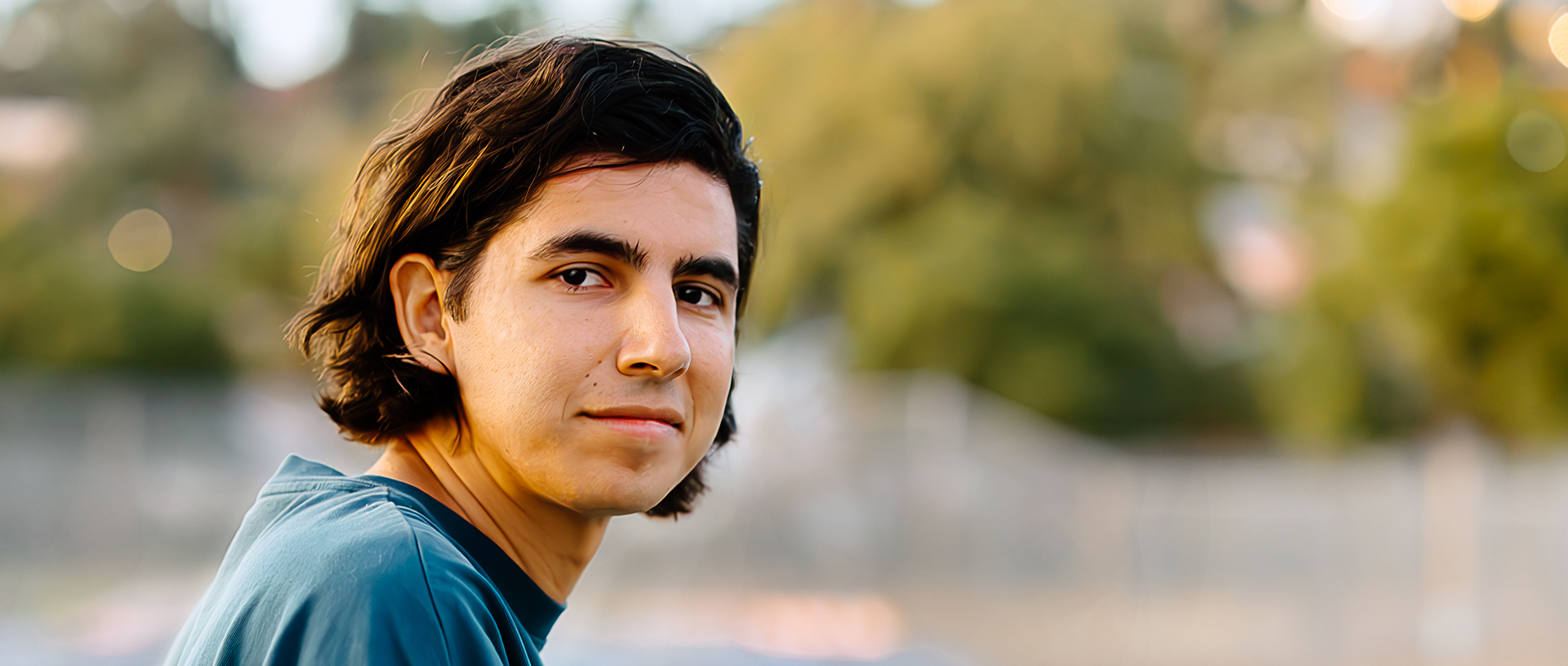
When Raul Sandoval (MAT ’23) graduated from Life Pacific College with a degree in biblical studies, he was ready for local church ministry, sure that he was done with school with no plans of returning. “I had a lot of difficulty with the school format, with retaining and engaging,” Raul says. “School was not my gift.”
He did feel skilled in and inclined toward pastoral work, and he’d longed to serve the local church that was close to his heart. Raul grew up as a skater kid in East Los Angeles, a historically predominant Hispanic neighborhood, attending church with his family every Sunday. Even from a young age, he recalls gravitating to the experience of the Holy Spirit in the Pentecostal church, along with the contemplative and meditative expression prevalent in Catholic mass. He valued growing in his spirituality and doing it alongside his community.
Still, even with a full heart for ministry, he experienced the tension of feeling on the outside when it came to his own cultural identity, and he wondered how it might fit in the context of ministry. “I don’t entirely fit in with Mexican culture or American culture,” says Raul, who is the son of immigrant parents. “I’m a bit removed from both. I’ve felt that also in training for ministry.” He sensed the weight of being the first in his family called to ministry, and he remained unsure how to offer his upbringing and background to the church.
In college, he served as an associate youth pastor in El Monte and was involved in a ministry that reached out to at-risk youth in Los Angeles. But upon graduating, he struggled to find a job in the local church.
Raul and his wife, Ashley, had been attending Bread Church, which he loved. A little over a year into attending, a staff member at Bread who was considering seminary invited Raul to join her for a campus preview event at Fuller. Since school was off the table for him, he didn’t think much of it, but he decided to tag along.
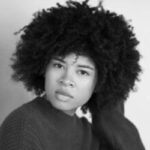
Chantelle Gibbs is content producer and managing editor of FULLER magazine.
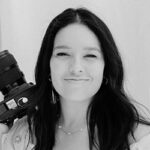
Karley Carrillo is a creative producer for Christian Assembly Church in Los Angeles and a freelance photographer. See more of her work at itsmekarley.com.
When Raul Sandoval (MAT ’23) graduated from Life Pacific College with a degree in biblical studies, he was ready for local church ministry, sure that he was done with school with no plans of returning. “I had a lot of difficulty with the school format, with retaining and engaging,” Raul says. “School was not my gift.”
He did feel skilled in and inclined toward pastoral work, and he’d longed to serve the local church that was close to his heart. Raul grew up as a skater kid in East Los Angeles, a historically predominant Hispanic neighborhood, attending church with his family every Sunday. Even from a young age, he recalls gravitating to the experience of the Holy Spirit in the Pentecostal church, along with the contemplative and meditative expression prevalent in Catholic mass. He valued growing in his spirituality and doing it alongside his community.
Still, even with a full heart for ministry, he experienced the tension of feeling on the outside when it came to his own cultural identity, and he wondered how it might fit in the context of ministry. “I don’t entirely fit in with Mexican culture or American culture,” says Raul, who is the son of immigrant parents. “I’m a bit removed from both. I’ve felt that also in training for ministry.” He sensed the weight of being the first in his family called to ministry, and he remained unsure how to offer his upbringing and background to the church.
In college, he served as an associate youth pastor in El Monte and was involved in a ministry that reached out to at-risk youth in Los Angeles. But upon graduating, he struggled to find a job in the local church.
Raul and his wife, Ashley, had been attending Bread Church, which he loved. A little over a year into attending, a staff member at Bread who was considering seminary invited Raul to join her for a campus preview event at Fuller. Since school was off the table for him, he didn’t think much of it, but he decided to tag along.
Chantelle Gibbs is content producer and managing editor of FULLER magazine.
Karley Carrillo is a creative producer for Christian Assembly Church in Los Angeles and a freelance photographer. See more of her work at itsmekarley.com.
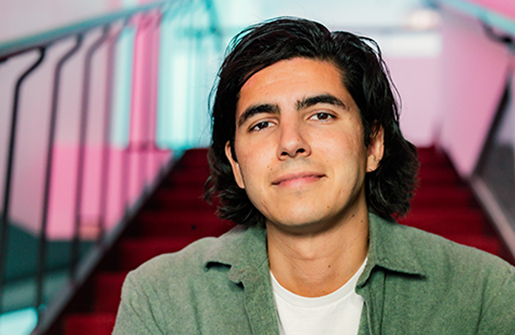

He was sitting in on a guest lecture when suddenly, everything stopped. “I had never had this happen to me before, but everything was just muted. I got this impression in my spirit and heard the words, ‘There are no shortcuts.’”
He sensed God challenging him about the path that he was supposed to be on. “I felt this very strong yet gentle tone and knew immediately that God was trying to get my attention, inviting me to consider Fuller.”
He talked with his wife and his senior pastors, hesitant because academia wasn’t his thing. It would be a step of faith, he thought to himself. “I don’t have the money for this, and I don’t necessarily feel I have the personality for it. But I felt like every step of the way, God was giving me grace for it and really peeling back some layers around things that I had believed about myself, like school not being for me.”
Those he confided in responded in a way that affirmed that God was leading him. So two weeks later, he applied and was accepted—but with a caveat. “I was admitted on probation because I had done so poorly in undergrad, which is funny,” he recounts with a laugh. “But I was able to get off of it fairly quickly because I did surprisingly well.”
For Raul, going to public school and coming from a neighborhood “on the wrong side of the tracks” planted many doubts and subconscious thoughts that he wouldn’t fit within a context like Fuller. “Years of hearing that because of my background or where I grew up, certain things weren’t and wouldn’t be for me.”
In his first quarter, he realized how much sense it made for him to be at Fuller, including being three stops away from the campus on the metro. There was a sense of ease watching God do transformative work in him and he was starting to see it. “It was great to feel like ‘I can actually do this’ and ‘This can be my world.’”
He gained more and more clarity on his vocation and calling as he took various classes, had discussions with other students, and read books he wouldn’t have come across if it hadn’t been for the classroom setting. Much of it helped clarify the ministry he felt he was supposed to be doing, what the needs were in his community, and what God’s vision is for the world. “A lot of that came from being on the ground, seeing it, and then engaging with it in the classroom.”
While Raul was enrolled in seminary, he had no expectations to start working at Bread Church. But as time went on and the church continued to grow, he saw a need for more pastorally oriented gifts, ones that aligned with exactly who he was and who he felt called to be.
A staff member—the same one who had encouraged Raul to join her to tour Fuller—moved back to London, opening up a spot on the pastoral team. He found himself meeting with the senior pastors in their backyard, sharing with them his heart and what he knew he could bring to the church. He had been with the church a couple of years at that point and felt he could be a stable and reliable presence for people—to be somebody that they could count on. And more than that, to bridge the gap between the transplants and the native Angelenos.
“Because LA is a port city, people come and go,” Raul says. “I felt like the church could do with some stability in terms of leadership. I’m from here. I know the city. I know the culture. I felt like the background that I bring, especially to a church like Bread, is necessary.”
He’s been serving on the pastoral staff as the community and social engagement leader ever since.
“Part of how I approached my responsibility at Bread is the weight of the stories and perspectives right in my neighborhood. I felt that I had a responsibility to bring witness to these other voices and also what God is doing in that demographic. Because he’s working there as well.”
Bread Church attracts transplants—people from other parts of the country or world who come to Los Angeles to work in Hollywood and entertainment. “Naturally, that’s our audience and that’s who we are going for. And often what is missed in churches with that kind of demographic is the voice from the other side.”
Raul says, “There’s this side of LA that often gets neglected, people you might not naturally think of when you think of Los Angeles. If the church is supposed to be a place where there’s a diversity of voices and perspectives, then the perspective of the native Angeleno needs to be included in that.” Raul knows that’s exactly what he offers.
“I’ve found it very moving to see people who aren’t from here that call Bread their home, to see them want to engage, be involved, and invest in the local community. That kind of thing can only happen if God is at work and if people really catch what it is that God is doing. I don’t think that comes naturally.”
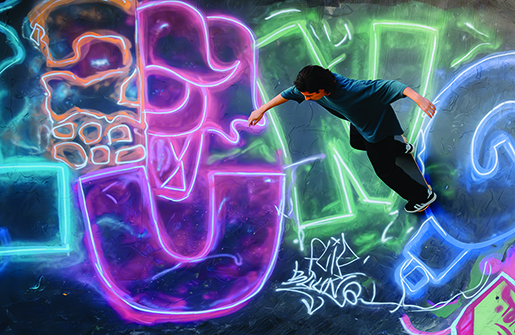

But it has been natural for Raul—leading and planning ministry initiatives to meet needs that are tangible and easily identifiable to him. He knows LA to be an immigrant city with immigrants from all over the world and refugees among them. And when Afghanistan fell to the Taliban in 2021, he learned of an organization that was helping refugees get settled in the city. Raul shared this with the church and named an opportunity to help families who had had to leave everything behind. Five people from the congregation committed to sponsoring these families for a year, helping them establish roots and complete ordinary tasks like obtaining a driver’s license, furnishing an apartment, enrolling kids in school, and navigating the US healthcare system.
The Adventist church Bread rents from has a shower program for the unhoused population in Hollywood to shower every week. Twice a year, Raul and his team put on a dinner for the people in that program. Recently, the outreach was “tailgate”-themed, so they had trucks, food, and a live band. Hosts served every guest, brought a meal to the table, and sat with them to hear their stories and get to know them. “The whole point of it was to meet a felt need. More than just having an assembly line and giving people a tray of food, though there’s a place for that and we need that, we wanted to do something a bit different and make our guests feel special.”
“What I’m reminded of is when Jesus says in Matthew 25: ‘I was hungry and you fed me, I was a stranger and you welcomed me in. I was a prisoner and you visited me, I was thirsty and you gave me a drink.’ Feeding, visiting, hosting—these are the things of the kingdom that are often the most effective. We don’t need to be the most resourced or educated. I just feel like we need to have that heart and go for the kingdom stuff. God really uses that to transform people and transform our communities.”
Raul says there are plenty more stories of what he’s been able to witness during his time at Bread, all underscored by what happens when you bring yourself wholly and uniquely to answer God’s call. “Fuller helped reinforce the idea that we’re whole beings, that we’re all interconnected and being formed. This idea really helped me understand that even as far back as my childhood, my experiences helped form and shape my view of God and my understanding of spirituality.” Reflecting on what he has seen God reveal to him in recent years, Raul thinks back often to his time at Fuller as profoundly formative, particularly because of how much it helped him to understand who he was and—beyond how he fit in—how much he was needed.
“The perspective I offer, this way of seeing the world and engaging with it, has been shaped by my being ‘outside looking in.’ We need Christian leaders to be informed by the folks on the outside. So try not to be discouraged if you find yourself on the outside because God uses people on the outside as much as he uses people on the inside.”
Cynthia Eriksson, dean of the School of Psychology & Marriage and Family Therapy, reflects on how the church might carry Christ’s hope into the world through our work in psychology and mental health care.